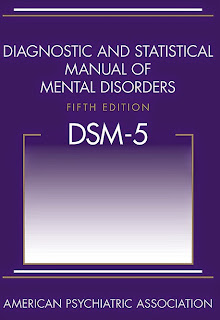Tuesday, March 31, 2015
Case Study Explores Posttraumatic Growth among Northern Irish Victims of Political Violence
In a new study published in Journal of Humanistic Psychology, Jane Simms conducted case studies of three victims of political violence in Northern Ireland. The study was guided by the model of growth developed by Tedeschi and Calhoun. The case study participants reported greater appreciation of life and changed relationships resulting from their trauma, and new possibilities that emerged from these changes. All but one participant felt increased personal strength, although all participants continue to struggle with distress in their lives. Religion and spirituality appeared to play a role in the narratives of the participants in ways that distinguished the participants from the others. A full text version of the article is available here.
Wednesday, March 25, 2015
Psychologists Use the DSM, But Are Dissatisfied With It, New Survey Research Shows
A recently published study coauthored by Division 32 Fellow Jonathan Raskin looks at psychologist attitudes toward the DSM-5 and finds that psychologists are not particularly satisfied with the manual.
Raskin, along with his coauthor and SUNY New Paltz colleague Michael Gayle, surveyed over 100 psychologists. They found that even though over 90% of psychologists report using the DSM, they are dissatisfied with numerous aspects of it and support developing alternatives to it.
The full study has been published in the Journal of Humanistic Psychology. It currently appears as an advance online publication and will appear in an upcoming print issue. For the abstract and access to the article in full, see the JHP website.
Raskin, along with his coauthor and SUNY New Paltz colleague Michael Gayle, surveyed over 100 psychologists. They found that even though over 90% of psychologists report using the DSM, they are dissatisfied with numerous aspects of it and support developing alternatives to it.
The full study has been published in the Journal of Humanistic Psychology. It currently appears as an advance online publication and will appear in an upcoming print issue. For the abstract and access to the article in full, see the JHP website.
Sunday, March 22, 2015
Existential Therapy is Evidence Based Practice
Evidence-Based Practice in Psychology is the current dominant paradigm for evaluating psychotherapy practice. At best, its aim is to help assure that therapists develop and utilize the appropriate clinical skills and employ strategies to help clients that are rooted in evidence, broadly understood. This replaces, though is often confused with, the previous paradigm of the empirically supported treatments, which sought to determine which rigidly applied modalities were appropriate for psychotherapy with particular diagnoses or problems based upon a more narrowly defined type of evidence.
While existential therapy is often criticized for lacking evidence based support for its practice, the article "Emotion, Relationship, and Meaning as Core Existential Practice: Evidence-Based Foundations” by Hoffman, Vallejos, Cleare-Hoffman, and Rubin provides strong evidence to help dispel this misconception. Drawing upon the standards of evidence-based practice, the authors utilize recent research and scholarship to demonstrate that when an appropriately trained and skilled therapist utilizes an existential therapy approach, it is consistent with the principles of evidence-based practice in psychology. This article should prove useful for existential therapists advocating for this approach in managed care and other settings that sometimes discourage its use with clients.
The article identifies how existential therapy's relational focus, emphasis on working with emotion and experience, and meaning-centered approach is an empirically valid approach to working therapeutically with a wide variety of clinical issues.
-- Louis Hoffman, Ph.D.
Wednesday, March 18, 2015
Division 32 President, Krishna Kumar, PhD: My Identity
Race, ethnicity, and religion
continue to plague interpersonal relations throughout the world at the
individual, societal, and international levels.
People appear to hold strong beliefs about racial, ethnic, and religious
differences and about the inferiority and superiority of their own groups. These beliefs seem to have no national
boundaries. Such beliefs simply would
not go away despite many societal efforts in the form of affirmative action
policies, laws, interfaith dialogue, and many positive everyday interactions
with peoples from different backgrounds.
Central to such beliefs are the questions “who am I,”
“who are we,” “are we different from each other,” or “are we pure anything?”
Unfortunately, local, rather than
global human community perspectives seem to shape people’s identities. Thus, traditionally my identity would involve
having been born and raised in India
I moved from India India
I had my DNA analyzed in an effort
to understand my current identity from my ancestry. What follows may sound like science fiction,
but our saliva contains an enormous amount of information. The DNA analysis was quite telling about the
migratory patterns of my ancestors from the beginning of humankind from Africa to many parts of the world. In this process of continuous migration over
thousands of years, my ancestors perhaps like anyone else’s, mixed and remixed
with different peoples changing and re-changing their linguistic, religious and
cultural practices. Thus, I realized
that my current identity as an Asian Indian born in a Hindu family is simply accidental
to my birth in India, which has little or no significance in the larger context
of a global human community. We are all
products of such mixtures ever since human beings began to walk. Race, ethnicity,
religion, and culture are not DNA deep.
At this point, I invite you to read about the details of my DNA analysis
and their implications written in my blog on PsychologyToday. Com:
Receiving my DNA
analysis on my ancestral migration patterns was an eye opener, making my
erstwhile readymade answer “I am from India” not right anymore. Read More
Sunday, March 8, 2015
Hearing Voices: Tracing the Borders of Normality
In this article, in The Lancet Psychiatry, linked below, Rhianna Goozee talks about the emergence of the Hearing Voices Movement. She discussed the way research has demonstrated how the line between "healthy" and "normal" minds has been blurred. She examines the hypothesis that early intervention and pathologizing experiences may actually increase rather than decrease the risk of psychosis.
Full text article here:
Saturday, March 7, 2015
"Is clinical psychology fearful of social context?" -- a lecture by Professor Mary Boyle
Professor Mary Doyle speaking at 2014 Division of Clinical Psychology annual conference in Glasgow.
Thursday, March 5, 2015
Psychotherapy Found to Be Equally Effective for Racial and Ethnic Minorities in Treatment of Depression
In a study published in Psychiatric Services, Burçin Ünlü Ince and colleagues (2014) conducted a meta-analysis to investigate whether and how effective psychotherapy is for racial-ethnic minority groups when they are treated for depression. The study utilized a total of 56 randomized controlled trials. Overall, the effect size was moderate (g=50), and in bivariate and multivariate analysis, race-ethnicity was found to have no moderating influence on outcome of psychotherapy for depression.
The researchers report: "Results suggest that psychotherapy is equally effective regardless of care seekers’ race-ethnicity. Future research should focus on filling in the gap between effective mental health care and the delivery of these services."
Wednesday, March 4, 2015
Presence of Meaning in Life Associated with Psychological Well-Being
Viktor Frankl, existential and humanistic psychologist and author of Man's Search for Meaning, pioneered the investigation of meaning in life as an adaptive psychological attribute. In a study that collected data cross 13 different universities, Jessie Dezutter and colleagues (2013) studied the impact of meaning in life on psychological adjustment in a sample of 8,492 American adults across 30 colleges and universities.
The researchers note that meaning of life has been defined as having a sense of coherence, an enhanced understanding of the world, and in finding a sense of purpose in life. Previous research has found a link between higher meaning in life in positive outcomes including more positive emotions and higher vitality, as well as less symptoms of depression and lower risky behavior.
The study distinguished between two dimensions of meaning in life:
(1) Presence of Meaning -- perception of significance, purpose and value
(2) Search for Meaning -- intensity of effort to establish or increase meaning in life
The study identified five types of people:
(1) High Presence--Low Search
These individuals scored highest in measures of psychological well-being and lower in negative indicators of psychosocial functioning.
(2) High Presence--High Search
These individuals scores the second highest in measures of psychological well-being, but not as high as the high presence-low search group.
(3) Low Presence-Low Search
Those scoring in this category were the lowest functioning of the sample.
(4) Low Presence-High Search
While still scoring low in functioning, they scores higher than the Low Presence-Low Search group. In particular, they scores higher in eudiamonic and psychological well-being, and scores lower in tendencies to break rules and were less likely to report social and physical aggression than the Low Presence-Low Search group.
(5) Undifferentiated
Scored at intermediate levels.
Full Text of Article Here:
http://sethschwartz.info/wp-content/uploads/2010/08/Meaning-in-Life-Clusters1.pdf
The researchers note that meaning of life has been defined as having a sense of coherence, an enhanced understanding of the world, and in finding a sense of purpose in life. Previous research has found a link between higher meaning in life in positive outcomes including more positive emotions and higher vitality, as well as less symptoms of depression and lower risky behavior.
The study distinguished between two dimensions of meaning in life:
(1) Presence of Meaning -- perception of significance, purpose and value
(2) Search for Meaning -- intensity of effort to establish or increase meaning in life
The study identified five types of people:
(1) High Presence--Low Search
These individuals scored highest in measures of psychological well-being and lower in negative indicators of psychosocial functioning.
(2) High Presence--High Search
These individuals scores the second highest in measures of psychological well-being, but not as high as the high presence-low search group.
(3) Low Presence-Low Search
Those scoring in this category were the lowest functioning of the sample.
(4) Low Presence-High Search
While still scoring low in functioning, they scores higher than the Low Presence-Low Search group. In particular, they scores higher in eudiamonic and psychological well-being, and scores lower in tendencies to break rules and were less likely to report social and physical aggression than the Low Presence-Low Search group.
(5) Undifferentiated
Scored at intermediate levels.
Full Text of Article Here:
http://sethschwartz.info/wp-content/uploads/2010/08/Meaning-in-Life-Clusters1.pdf
Tuesday, March 3, 2015
Authentic People Are More Psychologically Adjusted and Seen More Accurately By Others
In Journal of Personality and Social Psychology, Lauren J. Human and colleagues (2014) examined why well-adjusted people seem to be judged more accurately. Their investigation led them to discover that those who are well-adjusted are viewed more accurately due to the congruency between their personality and actions. In other words, more well-adjusted people were more authentic or congruent, and therefore were more transparent to others as a result. These findings support a key concept of humanistic psychology identified by Carl Rogers: a key ingredient of a fully functioning personality is congruency or authenticity.
Read the Full Text of Article Here:
https://www.gsb.stanford.edu/…/files/documents/Human_JTP.pdf
https://www.gsb.stanford.edu/…/files/documents/Human_JTP.pdf
Monday, March 2, 2015
Existential Variables of Meaning of Life and Hope Mediate the Relationship Between Religion and Psychological Well-Being
In Journal of Religion and Health, Marcin Wnuk and Jerzy Tadeusz Macinkowski (2012) investigated the relationship between religious belief and psychological well-being. In this study, they used a variety of measures, including the Daily Spiritual Experiences scale, Purpose in Life Test, Hearth Hope Index, Cantrol Ladder, and Positive and Negative Affect Schedule. As in previous research, spiritual experiences were positively related to satisfaction with life and positive affect, but were not found to be related to negative affect. Meaning of life and hope mediated the relationships between spiritual experiences and both positive psychological variables of satisfaction with life and positive affect. These findings suggest that people who are religious tend to be more satisfied with life and have more frequent positive emotional experiences, in part, because they have more meaning in life and are more hopeful.
Full Text of Article Here:
http://link.springer.com/…/…/s10943-012-9597-6/fulltext.html
http://link.springer.com/…/…/s10943-012-9597-6/fulltext.html
Subscribe to:
Comments (Atom)








